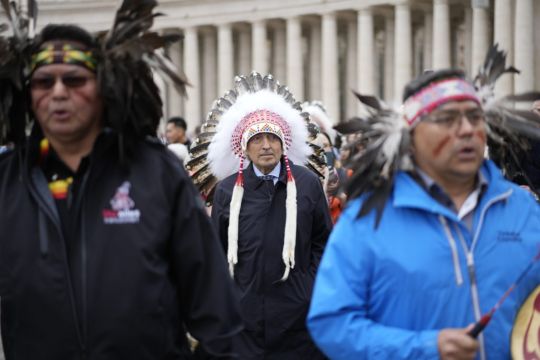Pope Francis has made a historic apology to Canada’s Indigenous peoples for the “deplorable” abuses they suffered in Catholic-run residential schools, and said he hoped to visit in late July to deliver the apology in person to survivors of the scandal.
Francis begged forgiveness during an audience with dozens of members of the Metis, Inuit and First Nations communities who went to Rome seeking a papal apology and a commitment from the Catholic Church to repair the damage.
The first pope from the Americas said he hoped to visit Canada around the Feast of St Anna on July 26.

More than 150,000 native children in Canada were forced to attend state-funded Christian schools from the 19th century until the 1970s in an effort to isolate them from the influence of their homes and culture.
The aim was to Christianise and assimilate them into mainstream society.
The Canadian government has admitted physical and sexual abuse was rampant at the schools, with students beaten for speaking their native languages.
The legacy of that abuse and isolation from family has been cited by Indigenous leaders as a root cause of epidemic rates of alcohol and drug addiction on Canadian reservations.
After hearing their stories all week, Francis told the Indigenous peoples that the colonial project ripped children from their families, cutting off their roots, traditions and culture and provoking inter-generational trauma that is still being felt today.

He said it was a “counter-witness” to the same Gospel that the residential school system purported to uphold.
“For the deplorable conduct of those members of the Catholic Church, I ask forgiveness of the Lord,” Francis said. “And I want to tell you from my heart, that I am greatly pained. And I unite myself with the Canadian bishops in apologising.”
The trip to Rome by the Indigenous peoples was years in the making but gained momentum last year after the discovery of hundreds of unmarked graves outside some of the residential schools in Canada.
The three groups of Indigenous met Francis separately over several hours this week, telling him their stories, culminating with Friday’s audience.
The president of the Metis National Council, Cassidy Caron, said the Metis elder sitting next her burst into tears on hearing what she said was a long-overdue apology.

“The Pope’s words today were historic, to be sure. They were necessary, and I appreciate them deeply,” she told reporters in St Peter’s Square.
“And I now look forward to the Pope’s visit to Canada, where he can offer those sincere words of apology directly to our survivors and their families, whose acceptance and healing ultimately matters most.”
First Nations chief Gerald Antoine echoed the sentiment, saying Francis recognised the cultural “genocide” inflicted on the Indigenous.
“Today is a day that we’ve been waiting for. And certainly one that will be uplifted in our history,” he said. “It’s a historical first step, however, only a first step.”

He and other Indigenous leaders said there was far more for the church to do on the path of reconciliation, but for now Indigenous leaders insisted on being involved in organising the papal visit to make sure Francis stops in places that hold spiritual importance to their people.
Natan Obed, president of the Inuit Tapiriit Kanatami, thanked Francis for addressing all the issues the Indigenous had brought to him. “And he did so in a way that really showed his empathy towards the indigenous people of Canada,” he said.
Nearly three-quarters of Canada’s 130 residential schools were run by Catholic missionary congregations.
Last May, the Tk’emlups te Secwepemc Nation announced the discovery of 215 grave sites near Kamloops, British Columbia, that were found using ground-penetrating radar.

It was Canada’s largest Indigenous residential school and the discovery of the graves was the first of numerous sites across the country.
Even before the grave sites were discovered, Canada’s Truth and Reconciliation Commission specifically called for a papal apology to be delivered on Canadian soil for the church’s role in the abuse.
As part of a settlement of a lawsuit involving the Canadian government, churches and approximately 90,000 surviving students, Canada paid reparations that amounted to billions of pounds being transferred to Indigenous communities. The Catholic Church has also paid tens of millions.
Canadian Prime Minister Justin Trudeau acknowledged Francis’s apology and said he looked forward to having him deliver it in person in Canada.

“This apology would not have happened without the long advocacy of survivors who journeyed to tell their truths directly to the institution responsible and who recounted and relived their painful memories,” he said.
“Today’s apology is a step forward in acknowledging the truth of our past in order to right historical wrongs, but there is still work to be done.”
After the papal apology, the audience continued with joyous performances of Indigenous prayers by drummers, dancers and fiddlers that Francis watched, applauded and gave a thumbs up to.
The Indigenous then presented him with gifts, including snowshoes. Francis, for his part, returned a First Nations cradle that the delegation had left with him overnight as he pondered his apology.







